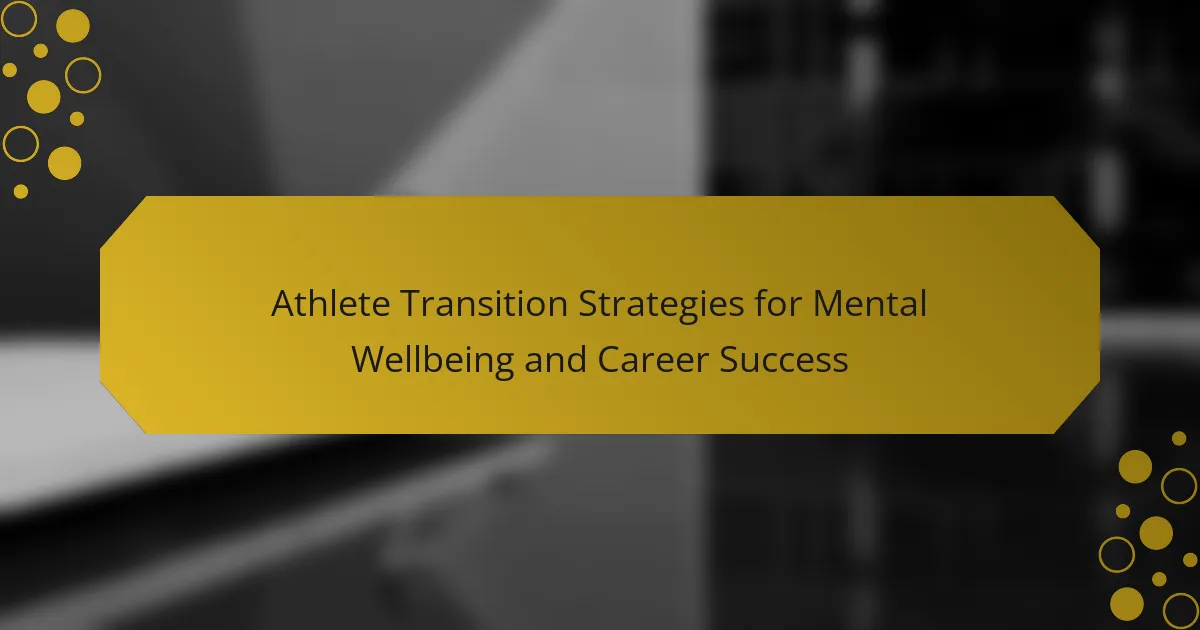Navigating the transition from competitive sports to new career paths can be challenging for athletes. Effective strategies include mental preparation, building a support network, setting new goals, and embracing continuous learning. Addressing mental health challenges is crucial for maintaining wellbeing during this period. Unique experiences, such as moving into coaching or entrepreneurship, can significantly impact an athlete’s journey toward career success.

What are effective transition strategies for athletes?
Effective transition strategies for athletes include mental preparation, establishing a support network, setting new goals, and embracing continuous learning. These strategies foster resilience and adaptability, essential for navigating career changes. Mental preparation helps athletes cope with identity shifts, while a support network provides emotional and practical assistance. Setting new goals creates a sense of direction, and continuous learning enhances skills relevant to new pursuits. By implementing these strategies, athletes can maintain mental wellbeing and achieve career success post-sport.
How do these strategies impact mental wellbeing?
Athlete transition strategies significantly enhance mental wellbeing by providing structured support during career changes. These strategies, such as mentorship and psychological training, foster resilience and adaptability. As a result, athletes report improved emotional health and decreased anxiety. Research indicates that effective transition planning can lead to a 30% increase in overall life satisfaction.
What role does career planning play in athlete transitions?
Career planning is crucial for athletes transitioning to post-sport life, as it facilitates mental wellbeing and career success. A structured approach helps athletes identify transferable skills, set realistic goals, and explore new opportunities. This proactive planning reduces anxiety and promotes a sense of purpose, essential for mental health during transitions. Engaging in career development activities can enhance self-esteem and provide a smoother adjustment to life beyond athletics.
What are the essential steps in creating a career plan?
Creating a career plan involves several essential steps. First, assess your skills, interests, and values to identify potential career paths. Next, set specific, measurable, achievable, relevant, and time-bound (SMART) goals. Then, research and explore opportunities in your chosen field, including networking and mentorship. Finally, develop an action plan outlining the steps needed to achieve your goals, including any necessary education or training.
How can athletes identify transferable skills?
Athletes can identify transferable skills by reflecting on their experiences and training. They should analyze skills like teamwork, discipline, and resilience, which are valuable in various careers. Conducting self-assessments and seeking feedback from coaches or mentors can further clarify these skills. Additionally, networking with professionals in desired fields can reveal how athletic skills apply to different roles.
What support systems are available for transitioning athletes?
Transitioning athletes can access various support systems to ensure mental wellbeing and career success. These include mentorship programs, mental health services, career counseling, and peer support groups.
Mentorship programs connect athletes with experienced professionals who provide guidance during the transition. Mental health services offer psychological support to help athletes cope with identity changes and stress. Career counseling assists in exploring job opportunities and skill development. Peer support groups create a community for sharing experiences and fostering resilience.
Each of these systems plays a vital role in addressing the unique challenges faced by transitioning athletes, ultimately promoting a smoother adaptation to life after sports.
How can mentorship aid in the transition process?
Mentorship significantly supports athletes during their transition by providing guidance and emotional support. It fosters a sense of belonging and enhances personal development, which is crucial for mental wellbeing. Mentors share experiences, helping athletes navigate career changes effectively. They also offer networking opportunities, which can lead to new career paths post-sport. Research indicates that athletes with mentors report higher satisfaction and lower anxiety levels during transitions.
What resources do sports organizations provide?
Sports organizations provide resources such as mental health support, career counseling, and educational programs. These resources help athletes navigate transitions effectively, enhancing their mental wellbeing and career success. For instance, many organizations offer workshops that focus on life skills and resilience training, which are crucial during retirement from sports. Additionally, access to professional networks can facilitate job placements in various industries, ensuring a smoother transition.

What are the common mental health challenges faced by transitioning athletes?
Transitioning athletes commonly face mental health challenges such as anxiety, depression, and identity struggles. These issues arise from the pressures of leaving competitive sports and adjusting to new life roles. Research indicates that up to 35% of retired athletes experience significant mental health issues. Additionally, the unique attribute of losing a structured routine can exacerbate feelings of isolation and uncertainty. Addressing these challenges is crucial for ensuring long-term mental wellbeing and career success.
How can athletes recognize signs of mental distress?
Athletes can recognize signs of mental distress by being aware of emotional changes, behavioral shifts, and physical symptoms. Common indicators include increased anxiety, mood swings, withdrawal from teammates, and changes in sleep patterns. Regular self-reflection and open communication with coaches and peers can enhance awareness of these signs. Seeking professional support when noticing these changes is crucial for maintaining mental wellbeing.
What coping strategies are effective for managing anxiety and depression?
Effective coping strategies for managing anxiety and depression include mindfulness, physical activity, and social support. Mindfulness practices reduce stress and enhance emotional regulation. Regular physical activity, such as jogging or yoga, boosts mood and promotes overall mental health. Engaging with supportive friends and family fosters a sense of belonging and reduces feelings of isolation. Additionally, cognitive-behavioral techniques can help reframe negative thoughts and improve coping mechanisms.

What unique attributes influence an athlete’s transition experience?
Unique attributes influencing an athlete’s transition experience include emotional resilience, adaptability, and support systems. Emotional resilience helps athletes cope with identity shifts post-retirement. Adaptability allows them to navigate new career paths effectively. Strong support systems, including family and mentors, provide crucial guidance during this transformative phase.
How do personal circumstances affect transition outcomes?
Personal circumstances significantly influence athlete transition outcomes by affecting mental wellbeing and career success. Factors such as family support, financial stability, and personal relationships can either facilitate or hinder an athlete’s adjustment to post-competitive life. For instance, athletes with strong familial ties often report better emotional resilience during transitions. Conversely, those facing financial pressures may experience increased anxiety, impacting their ability to focus on new career paths. Additionally, social networks play a crucial role; athletes with robust support systems are more likely to navigate challenges effectively. Understanding these dynamics is essential for developing effective transition strategies.
What role does age play in the transition process?
Age significantly influences the transition process for athletes, impacting mental wellbeing and career success. Younger athletes may face identity challenges as they shift from competition to retirement, while older athletes often deal with physical limitations and career planning. Research indicates that older athletes typically possess better coping strategies due to accumulated life experiences. Conversely, younger athletes may require more guidance and support to navigate this change effectively. Tailored transition programs can address these age-related differences, enhancing the overall experience for athletes at various stages of their careers.
How do younger athletes differ from older athletes in their transitions?
Younger athletes often adapt more quickly to transitions compared to older athletes due to their flexibility and openness to change. They typically embrace new training methods and technologies, which can enhance their performance and career longevity. In contrast, older athletes may rely on established routines and experience, resulting in a slower adjustment to new circumstances. This generational difference highlights the unique attribute of adaptability in younger athletes, which can be critical for mental wellbeing and sustained career success.

What are some rare but impactful transition experiences?
Athlete transitions often involve rare experiences that significantly impact mental wellbeing and career success. One impactful transition experience is the shift from competitive sports to coaching, which can provide a unique perspective on athlete development. Another rare experience is transitioning from sports to entrepreneurship, where athletes leverage their skills in a new domain. Additionally, engaging in mentorship roles after retirement can enhance emotional resilience and community connection. Exploring these transitions can lead to fulfilling new paths while maintaining mental health.
How do athletes’ cultural backgrounds shape their transition strategies?
Athletes’ cultural backgrounds significantly influence their transition strategies, affecting mental wellbeing and career success. Cultural values shape resilience, adaptability, and social support networks. For example, athletes from collectivist cultures may prioritize community and family support during transitions, enhancing emotional stability. Additionally, cultural narratives can impact self-perception and motivation, guiding athletes in navigating post-sport careers. Understanding these dynamics helps tailor transition programs to meet diverse needs, fostering holistic development and long-term success.
What exceptional cases highlight unique transition challenges?
Exceptional cases of unique transition challenges for athletes include identity loss, mental health struggles, and lack of support systems. Identity loss occurs when athletes grapple with their self-worth outside sports. Mental health struggles, such as anxiety and depression, can arise during career changes. Additionally, a lack of structured support systems can hinder successful transitions, leaving athletes feeling isolated. These challenges highlight the need for tailored strategies that address both mental wellbeing and career success.

What best practices can athletes adopt for successful transitions?
Athletes can adopt several best practices for successful transitions, focusing on mental wellbeing and career success. Emphasizing self-reflection helps athletes assess their strengths and weaknesses. Building a support network provides emotional and practical assistance during change. Setting realistic goals fosters a sense of purpose and direction. Engaging in continuous learning enhances skills and adaptability. Lastly, practicing mindfulness techniques can improve focus and reduce anxiety during transitions.
How can athletes maintain a positive mindset during transitions?
Athletes can maintain a positive mindset during transitions by focusing on adaptability and self-care. Embracing change as an opportunity for growth fosters resilience. Setting specific, achievable goals aids in maintaining motivation. Engaging in mindfulness practices, such as meditation or visualization, enhances mental clarity and reduces anxiety. Building a strong support network of coaches, teammates, and mental health professionals provides encouragement and guidance. Regularly reflecting on past successes reinforces confidence, helping athletes navigate transitions effectively.
What common mistakes should athletes avoid during their transition?
Athletes should avoid several common mistakes during their transition to ensure mental wellbeing and career success. First, neglecting mental health can lead to increased stress and anxiety. Second, failing to seek support from mentors or peers may result in feelings of isolation. Third, not setting realistic goals can hinder motivation and progress. Fourth, overlooking the importance of physical health can negatively impact performance in new endeavors. Finally, resisting change can limit opportunities for growth and adaptation.
What expert insights can enhance transition strategies?
Expert insights can significantly enhance athlete transition strategies by focusing on mental wellbeing and career success. Key strategies include fostering a growth mindset, which encourages adaptability and resilience. Establishing a strong support network is crucial; athletes should seek mentors and peers who understand their journey. Incorporating mindfulness practices can improve emotional regulation and reduce stress during transitions. Additionally, setting clear, achievable goals helps maintain motivation and direction. Finally, continuous education and skill development empower athletes to explore new career paths, ensuring a smoother transition post-competition.
